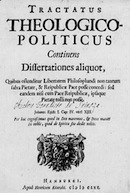
Source: Theologico-Political Treatise - Chapter V - of the ceremonial law
Spinoza's Chapter 5– Scriptural stories nessesary for the masses do not use logical reasoning (Page 5)

For men to be persuaded to believe in something that is not self-evident, Spinoza says, it must either be made known to them by the facts of natural experience or by logical reasoning. Logical reasoning has a greater effect on the mind in dispersing doubt.
But logical reasoning usually requires a long chain of arguments and careful attention therefore people prefer to be taught by experience rather than by logical order. To reach the majority of people the Scriptures where not set in logical order nor did they work from clear definitions but they were adapted to the understanding of the masses by recounting examples drawn from experience.
The existence of the Deity is shown in the Bible exclusively through narratives. Although these stories can give no clear knowledge or explanation of the nature or the working of their Deity the narratives can nevertheless teach men to obedience and devotion.
Knowledge and belief in the Scriptural narratives are necessary for the masses because their intellect is not capable of perceiving things clearly and distinctly (rationally).
Men who deny the stories and do not believe that a Deity exists or take more thought for men and the world may be accounted impious. Those who are ignorant of them but nevertheless know by natural reason that (Deus sive Natura) exists are more blessed than the common herd of believers. Men who are ignorant of the Scriptures and knows nothing by the light of reason, though they may not be impious, are yet less than human.
Spinoza says that though knowledge of the sacred narratives are particularly necessary to the masses, he does not mean absolutely all the stories in the Bible, but only the principal ones.